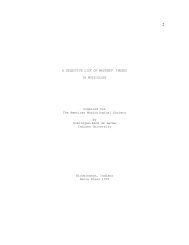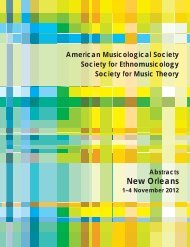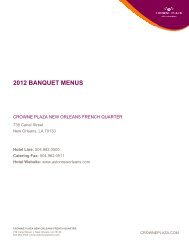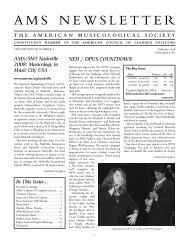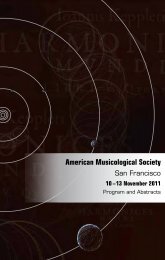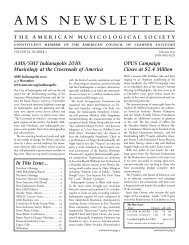AMS Philadelphia 2009 Abstracts - American Musicological Society
AMS Philadelphia 2009 Abstracts - American Musicological Society
AMS Philadelphia 2009 Abstracts - American Musicological Society
You also want an ePaper? Increase the reach of your titles
YUMPU automatically turns print PDFs into web optimized ePapers that Google loves.
134 saturday noon <strong>AMS</strong> <strong>Philadelphia</strong> <strong>2009</strong><br />
WAlter gieseKing As coMPoser:<br />
PreMieres of rePresentAtive WorKs<br />
froM his unPuBlisheD MAnuscriPts<br />
frank r. latino, university of Maryland, college Park<br />
With performers from the University of Maryland School of Music<br />
Maxwell Brown, piano; Joy Mentzel, piano;<br />
Michael Mentzel, baritone; Alyssa Moquin, cello;<br />
Onyu Park, soprano; Shelby Sender, piano<br />
Walter Gieseking (1895–1956) became one of the most celebrated pianists of the twentieth<br />
century, yet little is known about his life and even less about his compositions. Over the past<br />
decade there has been an upsurge of interest in his music, including the republication of his<br />
21 Kinderlieder, the second of his drei tanz improvisationen for piano (published as a “Tempo<br />
di Charleston”), and the first publication of his Divertimento for Clarinet in A and String<br />
Quartet, but a large body of his work has remained unknown. In this lecture-recital, we explore<br />
Gieseking as composer by examining unpublished works and other materials recently<br />
discovered in his personal archives in Wiesbaden, Germany. This vast collection, which is privately<br />
maintained by the Gieseking family, includes clippings, correspondence, manuscripts,<br />
photographs, programs, scrapbooks, and a myriad of other memorabilia. Until now, these rare<br />
documents have never been made completely available for research, and slides of many items<br />
will be presented publicly for the first time.<br />
Gieseking’s first works date back to 1903, and his manuscripts show that he continued to<br />
compose until his final years. He took this purported “hobby” most seriously, with the intention<br />
of having his music printed and performed. He periodically played his own music<br />
at home and abroad, often with distinguished colleagues (the muses for his works in many<br />
cases), and a number of his compositions were sold by three German publishers and Hawkes<br />
& Son in London. He also had his 21 Kinderlieder (1934–35), settings of poems by Richard and<br />
Paula Dehmel, issued privately, doubtless to circumvent the Nazi restrictions on publishing<br />
texts by Jewish authors.<br />
An avid promoter of contemporary music, especially during the first half of his career,<br />
Gieseking succeeded in developing a personal, modern yet tonal compositional style. The<br />
quality of his output is convincing and illustrates his largely unknown creative talent. The<br />
program comprises solo piano works, a piece for piano duet, a variety of Lieder, a melodrama<br />
for speaker and piano, and a set of variations for cello and piano, and all will receive their<br />
first public performance. These compositions enable us to trace Gieseking’s development as a<br />
composer through six periods: (1) the conservatory years, (2) the World War I years (when he<br />
served as a military musician), (3) the Weimar era, (4) the National Socialist era, (5) the World<br />
War II years, and (6) the post-war era. An accompanying look at Gieseking’s memorabilia,<br />
memoirs, correspondence, and other primary source materials enhances our understanding<br />
of his life and career during each period and allows us to place his output from each era into<br />
its proper context.<br />
Gieseking’s unpublished works demonstrate his wide-ranging interests as a composer and<br />
ability to write in multiple genres. When we consider his unpublished music alongside the<br />
published, we discover a dedicated composer, whose fine works are well worthy of revival.



